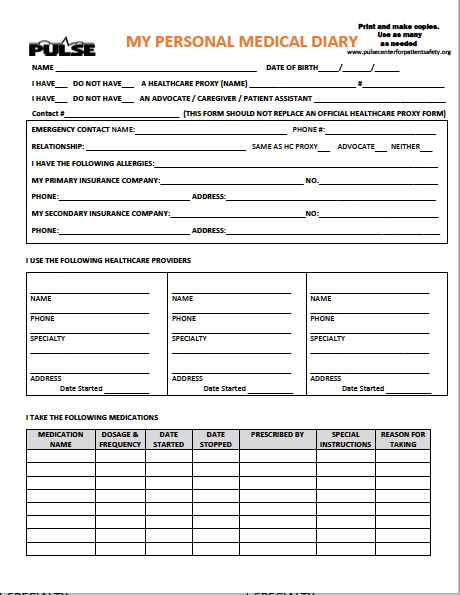TakeCHARGE Campaign Moves to “Step 2” — Keep Track of Your Medical History and Medications
The popular TakeCHARGE Campaign 5 Steps to Safer Health Care has entered its second month with a new task for everyone who wants to stay safer and enjoy more secure medical care. For the month of May, the mission for everyone is to make and maintain an up-to-date list of the medications they take, and to start keeping a personal medical history.
Why does this matter?
According to Ilene Corina, president of Pulse Center for Patient Safety, Education & Advocacy, the nonprofit behind the campaign, “Especially now, with Covid-19 placing extraordinary burdens on our healthcare system, we must do everything we can to help clinicians do their work efficiently and effectively. Nearly every visit to the doctor’s office or hospital involves reporting your medications to medical professionals. Save time and avoid mistakes by having a list prepared ahead of time and bringing it with you to your appointment. Then all you have to do is hand over a copy.”
And there are more critical, urgent reasons too. Suppose you are taken suddenly ill. An ambulance is called, paramedics arrive, and what’s one of the first things they want to know? “What meds are this patient taking?” Many people even post their medications list on the refrigerator door, so it will always be accessible in an emergency.
A Fuller Picture
What about a medical history? When we are sick or injured, we’re not usually thinking at our best. When a doctor or nurse asks you about your problem — what happened, when did it start, what care have you received, what makes it better or worse? — it’s very easy to miss out important information. But if you’ve written all these things down “as they happen” and can show that history to the clinician, the picture is clear. Just as a resumé helps an employer understand your suitability for a job, a personal medical history helps a clinician understand the whole picture of you as a patient. Not only does this history help the healthcare providers, it gives you a truer picture of your own long-term health.
The TakeCHARGE Campaign has detailed instructions (https://www.takecharge.care/2-keep-track-of-your-medical-history.html) on its website about how to complete these lists.
Pulse CPSEA has forms and other helpful info at https://www.takecharge.care/how-to-medication-list.html.
Prompts, tips, memes and videos are also being spread across the Campaign’s social media platforms:
Facebook: https://www.facebook.com/groups/takechargecampaign/
Twitter: https://twitter.com/TakechargeC
Instagram: https://www.instagram.com/takechargecampaign5steps/
LinkedIn: https://www.linkedin.com/in/takecharge-campaign-5160a31a3/
To learn more about the Five Steps of the TakeCHARGE Campaign, please call (516) 579-4711.

